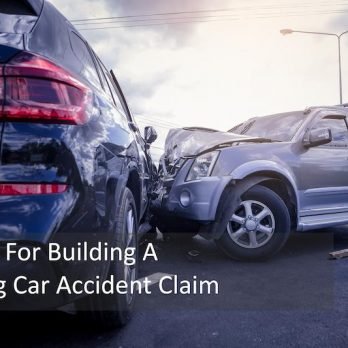Table of Contents [Show Table of Contents]
Renting a car for a trip, either for leisure or business purposes, is one of the most demanded options by many people who do not have their own vehicle or prefer to rely on this type of service. At present, car rental companies strive to offer their customers high-quality cars and quite advantageous conditions, something that is a great attraction for drivers.
But what happens if during a trip we have an accident with the rental car? This moment should worry you to a greater or lesser extent depending on the coverage included in the policy you have contracted when renting the vehicle, logically saving the personal severe damages.
As if we were driving our own car, in a rented one it is also necessary to take all possible precautions at the wheel. Traveling in a rented vehicle does not exempt us from respecting the traffic rules and being respectful to the rest of the road users to avoid possible accidents.
No one likes to think about the possibility of being in a car accident. But the fact is, accidents happen every day. And if you’re renting a car, there’s an even greater chance that you’ll be involved in one. That’s why it’s important to know what to do if you find yourself in this situation.
Here are the tips for dealing with a rental car accident, including hiring a car accident attorney.
How to act in case of an accident with a rented car
Remain Calm and Assess the Situation
The first thing you need to do is remain calm and try to assess the situation. If anyone is injured, call 911 immediately. If not, try to move your vehicle out of the way of traffic, if possible.
A very effective way to remain calm in the event of a road accident is to take a moment’s distance from the situation, both mentally and physically. Disconnecting for a few moments from what is happening or breathing fresh air will help to collaborate with greater serenity.
Exchange Information with the Other Driver

Once you’re safely out of the way of traffic, exchange information with the other driver, including your name, contact information, insurance information, and license plate number.
Take Pics of the Accident Scene
Use your phone or camera to take photos of the accident scene and of any damage to your rental car and the other vehicle involved.
When an automobile accident occurs occasionally this scene is going to pick up quickly. The vehicles involved are towed away, and the roadway and any other vehicle parts are cleared. So that traffic can continue to flow normally.
Before vehicles are moved or removed, it is good practice to take photographs of the accident scene, if possible from different angles, so that there can be different perspectives. Photographs can be considered very important evidence and help to clarify the facts.
Contact Your Rental Car Company
As soon as possible after the accident, contact your rental car company to let them know what happened and find out what their procedures are for dealing with such a situation.
Contact Your Insurance Company
You’ll also need to contact your insurance company to report the accident and find out what their procedures are for dealing with rental car accidents.
Follow All Instructions from the Police and Your Insurance Company
Once you’ve reported the accident to both your rental car company and your insurance company, follow all instructions from them regarding how to proceed. This may include getting repairs done through a certain repair shop or meeting with an adjuster at a certain time and place.
Keep Track of All Documentation Related to the Accident
Throughout the process of dealing with a rental car accident, it’s essential to keep track of all documentation related to the incident, including police reports, repair estimates, and receipts for any expenses you incur as a result of the accident.
Be Patient and Cooperative
Dealing with a rental car accident can be stressful, but it’s important to be patient and cooperative throughout the entire process.
Don’t Sign Anything Without Reading It First
When dealing with either your rental car company or your insurance company, don’t sign anything until you’ve read it carefully and understand what you agree to.
Keep Detailed Records of Everything
In addition to keeping track of all documentation related to the accident, it’s also important to keep detailed records of everything that happens during the claims process. This includes dates and times of phone calls and meetings, as well as copies of any correspondence you receive.
Be Prepared for a Long Process
Unfortunately, resolving a rental car accident can often be a long and drawn-out process. It’s important to be prepared for this so that you don’t get frustrated or angry along the way.
Stay Calm and Polite
Throughout the entire process, it’s important to stay calm and polite when dealing with anyone involved in resolving the accident, including police officers, insurance adjusters, and repair shop employees. Losing your temper will only make things more difficult for you in the long run.
Be Honest About What Happened
It’s also important, to be honest about what happened during the accident itself. Lying about what happened will only make things more difficult for you down the road when evidence comes to light that contradicts your story.
Don’t Admit Fault
Even if you think you might have been at fault for causing the accident, don’t admit fault until everything has been fully investigated by both your insurance company and/or the police.
Seek Legal Help If Necessary

If you find yourself in a situation where you can’t reach an agreement with either your rental car company or your insurance company, seek legal help from an experienced car accident attorney who specializes in such cases.
Does Your Car Insurance Cover Rental Cars?
You’re on vacation, and you want to rent a car. But does your car insurance cover rental cars? The answer is maybe. It depends on your car insurance policy and the type of coverage you have.
Your Personal Auto Insurance Policy
If you have a personal auto insurance policy, it usually extends to rental cars. However, there are some caveats.
First, your policy likely only covers rentals in the U.S. and Canada. So, if you’re renting a car in another country, you’ll probably need to purchase additional insurance from the rental company.
Second, your personal auto insurance policy will only cover damages to the rental car if you have collision and comprehensive coverage. If you don’t have these types of coverage, you’ll be responsible for paying for any damages to the rental car out of pocket.
Third, your personal auto insurance policy likely has a deductible that you’ll need to pay before the policy kicks in.
So, if you damage the rental car and file a claim with your insurance company, you’ll need to pay the deductible before your insurance company reimburses you for the remaining damages.
Credit Card Coverage
Another way to potentially get coverage for damages to a rental car is through your credit card issuer. Many credit card companies offer rental car coverage as a benefit to cardholders. However, there are usually some restrictions.
For example, many credit card companies only extend coverage to rentals that are 30 days or less. So, if you’re planning on renting a car for an extended period of time, this coverage probably won’t help you.
Another restriction is that credit card coverage usually only applies to damage due to collision or theft. So, if you damage the rental car in some other way like by driving off-road), your credit card company probably won’t cover it.
Rental Car vs. Nonrental Car Crashes
According to data from the National Highway Traffic Safety Administration, there were 6 million police-reported traffic accidents in the United States in 2018. Of those accidents, 2.6 million involved passenger cars, and 1,6 million involved light trucks such as pickups, SUVs, and vans.
How many of those accidents involved rental cars? It’s hard to say for sure because the NHTSA doesn’t track that data. However, we know that there are approximately 36 million rental car transactions in the United States annually.
That means that even if every single one of those transactions resulted in an accident (which we know isn’t the case), rental cars would still account for less than 0.5% of all police-reported traffic accidents in the country.
In other words, you’re much more likely to be involved in a crash if you’re driving your own car than if you’re driving a rental.
In conclusion, accidents happen, and that’s just a fact of life, but if you’re prepared ahead of time, it can make dealing with them a lot less stressful and hopefully avoid any drama.
By following these tips and getting help from this website, you’ll be on your way to handling a rental car accident like a pro!










